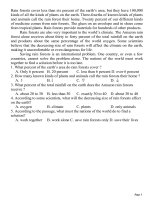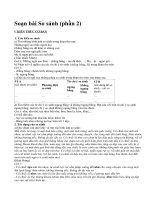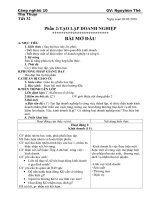20 bài reading (quetions) phần 2
Bạn đang xem bản rút gọn của tài liệu. Xem và tải ngay bản đầy đủ của tài liệu tại đây (118.13 KB, 20 trang )
ENGLISH AS A GLOBAL LANGUAGE
The main reason for the widespread demand for English is its present day
importance as an international language. Besides serving the infinite needs of its
native speakers, English is a language which is used in science, technology, media,
communication, international conferences, and so on.
There are more than 350 million people speak English as their native language.
Another 350 million speak it as a second language. Besides, it is quite difficult to
get the information of how many people speak it as a foreign language.
English is increasingly becoming popular. Most of the scientific inventions
were carried out in the English-speaking countries. Computer programmes are
designed in English. Most of books for research and reference are English-written.
English is used in international negotiations, trade, and conferences. English is
taught in most of high schools and universities.
People should learn English which is considered as the useful tool in many fields.
1. What is the main reason for the widespread demand for English?
A. It is a foreign language B. It is an international language
C. It is a mother tongue D. It is a native language
2. How many people speak English as a foreign language?
A. 300 million B. 350 million C. 700 million D. We do not know
3. Computer programmes are designed in _____.
A. English B. French C. Japanese D. Chinese
4. _____ is used in most of books for research and reference.
A. Vietnamese B. French C. Indian D. English
5. In most of high schools and universities, _____ are taught.
A. Russia B. Japanese C. English D. Chinese
Page 1
Every year students in many countries learn English. Some of these students are
young children. Others are teenagers. Many are adults. Some learn at school, others
study by themselves. A few learn English just by hearing the language in film, on
television in the office, or among their friends. But not many are lucky enough to
do that. Most people must work hard to learn another language.
Learning another language! Learning English! Why do all these people want
to learn English? It is not difficult to answer that question. Many boys and girls
learn English at school because it is one of their subjects. They study their own
language, and Math... and English. (In England, or America, or Australia, many
boys and girls study their own language which is English, and Math,... and another
language perhaps French, or German, or Spanish.)
Many adults learn English because it is useful for their work. Teenagers often
learn English for their studies, because some of their books are in English at the
college or university. Other people learn English because they want to read
newspapers or magazines in English.
1. According to the writer, ________
A. only adults learn English.
B. no children like learning English.
C. English is only useful to teenagers.
D. English is popular in much of the world.
2. Many people learn English by________.
A. watching videos only. B. hearing the language in the office.
C. talking with the film stars. D. working hard on their lessons.
3. Many boys and girls learn English because ________.
A. English can give them a job. B. it is included in their study course.
C. their parents make them. D. they have to study their own language.
4. In America or Australia many schoolchildren study ________.
A. English as a foreign language
B. English and Math only.
C. such foreign languages as French, German, and Spanish.
D. their own language and no foreign language.
5. Many adults learn English because ________.
A. their work is useful. B. they want to go abroad.
C. most of their books are in English. D. it helps them in their work.
Page 2
There are several things of spoken English that make it difficult for me to
understand. First, many words are not pronounced as they are spelled, so when I
learn new words through reading, I sometimes do not understand them when they
are spoken. Second, native speakers have a wide range of accents. A British accent
is very different from a Texas one. Third, there are a lot of idioms and slang
expressions. These expressions also differ depending on the area a speaker is from.
Finally, there are sounds that do not exist in my native language. These sounds are
difficult for me to distinguish.
1. Does the writer have any difficulties in learning English?
A. Written English makes it difficult for him to understand.
B. Spoken English makes it difficult for him to understand.
C. He has no difficulty in speaking English.
D. He has difficulty in writing English.
2. Many English words are pronounced ______ they are spelled.
A. differently from B. the same as C. similarly D. correctly as
3. English native speakers have _______.
A. the same accents B. only one accent
C. two accents, British and American D. many different accents
4. English idioms and slang expressions ________.
A. are used by very few people
B. are only used by the English men
C. are only used by the Americans
D. are differently used depending on the area a speaker is from
5. English sounds and the sounds of the writer's native language ______.
A. are the same B. are easy for him to distinguish
C. are difficult for him to distinguish D. A and B
Page 3
English is my mother tongue. Besides, I can speak French and Spanish. I studied
the two languages when I was at high school. Now, I am still learning Spanish at
the University. As for me, mastering a foreign language is not easy. After studying
a language, practice is very necessary and useful. Travelling to the country where
the target language is spoken is very helpful, but if you can not speak the language
well enough you will certainly have troubles. I also frequently go to the movies,
watch television, listen to the radio in the language I am trying to learn. Reading is
another good way to learn. Books are good, but I personally think newspapers and
magazines are better. However, getting some knowledge of the language is the
most important thing. Grammar and vocabulary should be mastered first.
1. How many languages can the writer speak?
A. 1 B. 2 C.3 D. 4
2. The writer has learnt Spanish _______.
A. in Spain B. at high school C. at University D.B and C
3. Travelling may cause troubles if _______.
A. you cannot speak the language well enough.
B. you can speak the language well enough.
C. you can speak the language bad enough.
D. you can communicate in the target language.
4. Some useful ways to practise your target language are _______.
A. listening to the radio and watching TV in the language.
B. reading books in the language.
C. seeing films in the language.
D. All are correct.
5. According to the writer, what should be mastered first?
A. Vocabulary B. Vocabulary and grammar
C. Writing skill D. Reading skill
Page 4
Alexander Graham Bell was born in Edinburgh, Scotland in the nineteenth century,
and later came to the United States. Several members of his family did a great deal
to encourage him in the field of science. His father helped him a lot by supervising
his work with the deaf. When he worked with the deaf and investigated the science
acoustics, his studies eventually led to invention of multiple telegraph and his
greatest invention - the telephone. He dedicated the last quarter century of his life
to advances in aviation.
1. What was Alexander Graham Bell's greatest invention?
A. multiple telegraph B.telephone C. aviation D. acoustics
2. To what did Bell dedicate the last years of his life?
A. acoustics science B.aviation C. adventure D. architecture
3. How many years did Bell dedicate to aviation?
A. 100 B. 50 C. 35 D.25
4. What can we conclude about Alexander Graham Bell?
A. He worked very hard, but never succeeded.
B. He spent so many years working in aviation because he wanted to be a pilot.
C. He dedicated his life to science and the well-being of mankind.
D. He worked with the deaf so that he could invent the telephone.
5. Which of the following statements is NOT true?
A. Bell was born in the 18th century
B. Bell worked with the deaf
C. Bell experimented with the science of acoustics
D. Bell invented a multiple telegraph
Page 5
Engineers have been key figures in our era of technology. At present there is
no aspect of life which does not require the skills and services of engineers.
Engineers help us store our food longer and better by discovering new methods
of refrigeration both at home and in transit.
Without them, there would be no radio, no television, no telephones and no
telegraph lines.
They have, in short, brought us great changes in our everyday life.
1) _____ have been key figures in our era of technology.
A. Engineers B. Engineer C. Scientist D. Scientific
2) If there ______, there would be no radio, no television, no telephones
and no telegraph lines.
A. were engineers C. were not engineers
B. were scientists D. B & C
3) What does life require?
A. the skills C. the services of engineers
B. the skills of engineers D. B & C
4) What do engineers bring to us?
A. television B. great changes C. telephones D. A & C
Page 6
A recent survey has shown that the busiest shopping street in the world is not in
London. New York, or Paris, but in Warsaw, Poland. Nowy Swiat, which means
New World, has an incredible 14,000 Poles walking down it every hour. It's a
lovely place to shop. The pavements are very wide. There are statues, palaces,
attractive town houses and high-class restaurants. The buildings are not too high.
They look old, but in fact the whole city was rebuilt after World War II.
There aren't any billboards or neon lights. There isn't any loud music, and
there aren't many tourists. People think that: Polish shops have nothing to sell, so
nobody comes shopping here. The world does not know about this paradise for
shoppers yet.
It is now possible to buy almost everything in Warsaw. There are a lot of
shops from the West, but the interesting thing is that Polish manufacturers are also
now producing high quality goods. They are good because the products are not
mass produced for world consumption. Nowy Swiat has a lot of small shops,
specialist shops and chic shops. It hasn't got the huge department stores that sell the
same products everywhere.
1. The busiest exciting shopping street in the world is in ________.
A. Paris B. Milan C. Warsaw D. New York
2. How are the pavements in Warsaw?
A. They are quite narrow. B. They dirty and small.
C. They are very wide. D. They are full of yellow leaves.
3. When was the whole city rebuilt?
A. After the second world war B. In1930
C. In World War II D. Before the 1990s
4. In Nowy Swiat, tourists can _______
A. see lots of billboards and neon lights
B. listen to loud music in the street
C. buy high quality goods
D. buy goods in huge department stores that sell the same things everywhere.
5. According to the author, Nowy Swiat is considered to be _______
A. a center of fashion B. a paradise for shoppers
C. a crowded and dusty place D. a new world of businessmen
Page 7
Anyone who visit England would like to spend some time in Strafford -upon -
Avon. Located in the center of England, it is a town that is rich in both history and
culture. It's population is about 23,000. Strafford - upon - Avon is famous because
it is the place where the talented playwright Shakespeare was born and died. When
you come there, you can visit his birthplace, and some buildings which used to
belong to his family. There are many other buildings that are worth visiting in the
town. Enjoying an evening in Strafford - upon - Avon is very interesting. There are
restaurants that are suitable for all tastes. In the evening, the Royal Shakespeare
Theatre offers interesting plays written by Shakespeare and you have a chance to
see some of the best actors and actresses of England on stage. There are many
other kind amusement and entertainment waiting for you.
1. What is Strafford - upon - Avon rich in?
A. plays B. population C. entertainment D. history and culture
2. Strafford is the place _______.
A. where Shakespeare was born and died B. which is overpopulated
C. which is very rich D. that does not belong to England
3. The buildings in Strafford _______.
A. are all in the possession of Shakespeare B. have been demolished
C. are worth visiting D. are old and ugly
4. Restaurants in Strafford are _______.
A. delicious B. expensive C. rich D. suitable for all tastes
5. In the Royal Shakespeare Theatre, you can enjoy ________.
A. films B. actors and actresses
C. plays written by Shakespeare D. food of all kinds
Page 8









